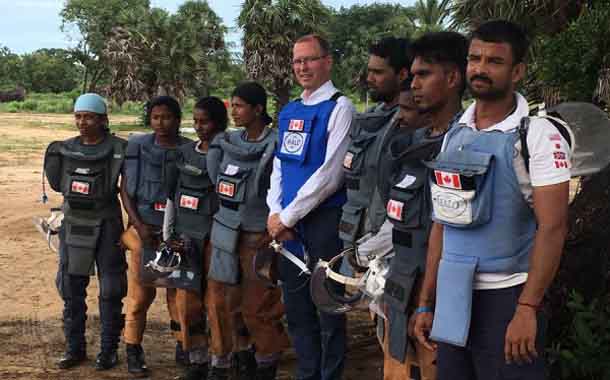Canada is committed to eliminating landmines globally as set out in the historic Ottawa Treaty to Ban Landmines; it was adopted 20 years ago in Ottawa, Canada, in December 1997.

High Commissioner David McKinnon in Sri Lanka Northern Province; he tweeted: ???Near Jaffna met members of dedicated The HALO Trust team supported by Global Affairs Canada, clearing one of the world???s most heavily mined places. Such work means a terrible legacy of the conflict in Sri Lanka could be history by 2020??? pic via: @ McKinnonDavid
Advocacy groups say ???the Ottawa Treaty, which bans all anti-personnel mines, is one of Canada???s great humanitarian contributions to global peace and security??? but warns ???its vision of a landmine free world is under threat???, according to a report by Radio Canada International. The report further added that, ???the problem is a global decline in funding, as stated in a news release from a coalition of anti-landmine advocacy groups???.
???The Ottawa Treaty or the Mine Ban Treaty, formally the Convention on the Prohibition of the Use, Stockpiling, Production and Transfer of Anti-Personnel Mines and on their Destruction, bans completely all anti-personnel landmines (AP-mines) around the world. To date, there are 161 States Parties to the treaty and 36 United Nations states not party???, according to the Canadian Landmine Foundation.
20 yrs ago today #OttawaTreaty opened for signature. 162 states are now party to the ban on anti-personnel landmines. We hope #Lka joins them very soon. @CanHCSriLanka @MFA_SriLanka https://t.co/nH2VbJSA2W
??? David McKinnon (@McKinnonDavid) December 3, 2017
The top Canadian diplomat stationed in Sri Lanka, High Commissioner David McKinnon visited Northern Sri Lanka on the eve of the Ottawa treaty anniversary. In a series of social media posts to mark this milestone, the High Commissioner of Canada in Sri Lanka said:
???20 yrs ago today Ottawa Treaty opened for signature. 162 states are now party to the ban on anti-personnel landmines. We hope Sri Lanka joins them very soon.???














